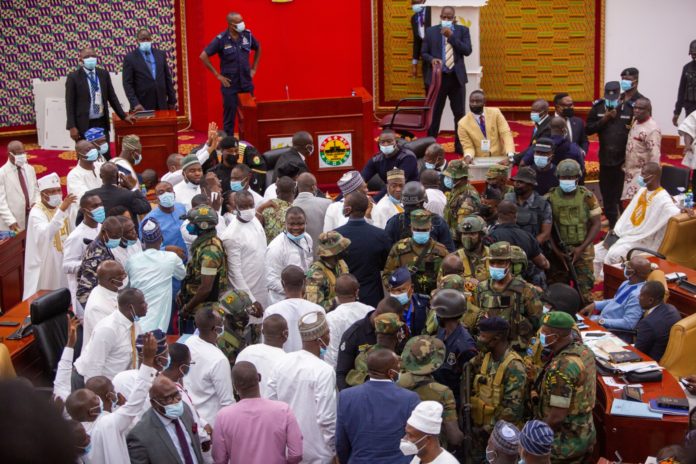On the morning Ghana’s new Parliament was set to be sworn in, there was unexpected rainfall amid the dry season across the country.
It would have been almost fitting for Ghana’s new democratic dawn had everything gone according to plan.
But as the showers put the dust at bay, for the time being, Ghana’s new legislators had been in an almost five-hour deadlock over voting processes to elect a new Speaker of Parliament.
The 2020 election left Ghana’s Parliament with no clear Majority after the governing New Patriotic Party (NPP) and the opposition National Democratic Congress (NDC) won 137 seats each, with one independent MP.
Tensions started from the onset of the sitting before midnight on January 6 when the NDC legislators trooped in early to occupy the Majority side of Parliament.
Most of the NPP MPs who came later on decided to indulge their colleagues but a few of them got agitated with one of them getting into a shoving match with NDC MPs.
The tone had been set for the evening.

After heated debate over the status of an opposition MP-elect who had been barred by a court from taking part in the inauguration of the new Parliament, what followed was a standoff over the voting process for the Speaker as the NDC insisted on a secret ballot in the belief that there were some NPPs MPs planning to stray from the party line.
For hours, scuffles broke out, led by the NDC legislators’ Whip, Muntaka Mubarak, who tried to make sure his opposing Whip was not policing ballots.
At the situation’s most intense, brawls broke out with NDC MPs ransacking the voting areas and snatching the ballot box on live TV.
Armed military and police personnel then stormed Ghana’s Parliament adding to the chaos in what was one of the most jarring and shocking occurrences since Ghana returned to democratic rule.
A security analyst, Col. Festus Aboagye told Ubuntu Times the military intervention was unacceptable and further evidence that Ghana’s democracy was on tenterhooks following the 2020 election.
Col. Aboagye was already unhappy that the military was used to police the polls.
Their presence in Parliament made it clear to him that Ghana’s democracy, which is consistently hailed by the international community, is actually becoming more violent.
“Everything that was happening in the House was a pure question of law and order, not a security situation as if some terrorists had crashed into the House and held hostage the Parliamentarians.”
“Why bring ourselves to a point where every issue should have the military in front line deployment? It is not appropriate,” he adds.

The opposition leader, John Mahama also condemned the chaos, mainly the invasion by the military personnel.
“The recent use of the military in civil democratic processes has become a major worry and gives the impression that this administration is continually seeking to resurrect the exorcised ghosts of our military past,” said Mahama in a statement.
The military and police were in the chambers for about 15 minutes before marching out after the NDC MPs refused to back down.
They chanted “we shall resist oppressors’ rule” whilst hooting at the soldiers.
When things calmed down and voting began, Ghana had officially gone almost five hours without a Legislature because no Speaker had been elected to swear in the new Parliamentarians.
The aggression of the NDC MPs appeared to pay off as they started celebrating during the counting as it became apparent their nominee for the Speaker position, Alban Bagbin had the most votes.
The situation escalated after one NPP MP, Carlos Ahenkorah, snatched some sorted ballot papers due to be counted and tried to run out of the building with them.
The NPP MP was stopped by some NDC MPs beaten up before Parliament security intervened.

For a research fellow with the Institute of Democratic Governance, Ewald Garr, the whole evening “shows how low we have descended as a country.”
The MPs are only “thinking about partisan interests and not the national interest,” he tells Ubuntu Times.
Hours later, the frustration of what he called infantile behavior by the MPs was still in his voice.
The hung Parliament has increased the need for more consensus-building than in past Parliament were there have always been clear majorities.
President Akufo-Addo, who’s swearing-in later on January 7 hinged on the election of a Speaker, had earlier been stressing the need for both sides of Parliament to work together.
But Garr, like many Ghanaians watching, was left upset by the fact this Parliament failed at the first hurdle.
He, however, notes they can learn from this nadir.
“We should see it as an insight into the future. There is definitely the need for our Parliamentarians to be a bit more consultative, build consensus on issues, and put Ghana first,” says Garr.
After the chaos, Bagbin was elected Speaker and swore in the new MPs. It was the first time Ghana has had a President and a Speaker from different parties.
Later that day, President Akufo-Addo stood before Parliament to be sworn-in as President but his first address as President for the next four years made no mention of the embarrassing breakdown of law and order earlier.

The government is yet to officially comment on the incidents though there are some suggestions that Parliament will probe the incident.
It also remains unclear who ordered military incursion on the chamber of Parliament.
Garr shied away from saying he was disappointed but said he wished President Akufo-Addo would have condemned the chaos and “spoken about it to show that he abhorred what happened.”

